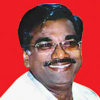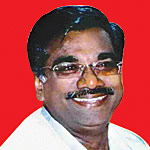Emperor Akbar had a dream. He woke up with a start. And the first thing he did early in the morning was to call his court astrologer.
“Yesterday night I experienced the horror of losing all my teeth except one. What does my dream signify?” asked Akbar. The astrologer took a lot of time in decoding the dream. After an hour or so he said, “Your Majesty! You will lose all your kith and kin before you die.”
Akbar wanted to verify the truth of the matter. He called in his minister Birbal and told him of his dream and asked him to find out its significance. Birbal took little time to come out with an answer: “Your Majesty!” he said, “Your dream is a harbinger of good news. It says you will live longer than all your relatives and friends.”
Akbar’s sorrow-filled eyes began to gleam with joy. He honoured Birbal with his pearl necklace.
Remember friends! Birbal only repeated the idea of the astrologer, but in different words. If we have love for others, we will put even the negative things in a positive manner. It is this love for others that shows up the God in us.
What is Love? This is the most difficult question on Earth for everyone has an answer to give. And no two answers agree. This may be the reason why knowledgeable people, as slippery as an eel, say: “If you ask me I don’t know. If you don’t ask me, I know”. True! Love is like Poetry too difficult to define. But the religious minded have the easiest answer to give. They unanimously say: “God is Love; Love is God.” Well said! These powerful words talk volumes. But the real difficulty lies in understanding these worldly wise words, for we can neither see God nor Love. “Do you see the air you breathe in and out? Because you cannot see the air will you ever rush to deny the existence of air?” We are baffled by their next argument. And so we leave it at that and go on mulling over Love, the very incarnation of the omnipotent and omniscient God.
One thing is certain. Planet Earth can never survive without Love. All religious texts invariably preach this doctrine. That’s why it is said “Love teaches even asses to dance”. Whoever has said it said it well.
The other day I was browsing through a book of Tamil Folktales with a spiritual slant. I found an interesting tale that was trying to find an answer, an agreeable one at that, for the poser. Let me narrate it to you:
Long long ago, no one knows how long ago, in a village lived a potter. He had his wheel under the shade of a bushy tree, just a few yards away from his hut. He had a bonny goat tethered to the tree trunk.
One fine morning the potter was quite busy in making pots to be sold in the forthcoming festive fare. A sage took interest in the potter and his wheel. Wishing to watch the birth of pots from clay, he stood by the side of the potter. The clay and the wheel were producing pot after pot. Amazed, the sage praised the deft hands of the potter and involved him in a conversation.
“Are you rearing that goat?” asked the sage. “Yes, of course,” the potter replied, “I saw it meandering away from the forest. I caught it and tied it to this tree.”
“Why did you tie it to the tree? It has its freedom to wander,” said the sage. “Oh, I need a goat to be offered as sacrifice to God,” replied the potter. The sage interrupted him and asked, “For what purpose?” “You talk as if you are from a different world. Don’t you know that sacrifice appeases the God and He blesses us with health and wealth?”
The sage as if infuriated by the potter’s words took one of the pots kept ready for sale and dashed it against the floor. The pot broke to shreds.
“Oh, you! What have you done to my pot? Are you a sage or a madman?” howled the potter. “Hei! I thought my act would please you!” said the sage keeping his cool. “What are you talking? How can the act of breaking the pot I have made with my own hands ever please me? Apart from breaking my pot you collected all the shreds and now you are giving it to me in all piety. Your act only angers me. You call yourself a sage, eh?” blurted out the potter.
The sage smiled. “My dear potter! My act of breaking the pot you have made has angered you. But you want to kill the goat that is God’s creation and offer it to the Creator Himself just to please and get favours done. Is it not stupid of you to try to please Him in this manner and seek His blessings? Show me a mother on earth who is pleased to see her child killed!”
Several such questions from the sage baffled the potter. As the sage went on his way, the potter began to think. His hands obeying the commands of his mind untied the goat. His eyes enjoyed the sight of the goat gambolling and rushing back into the forest.
The story is over. If we read between the lines, we are sure to know what Love is and who God is. Kudos to the unknown narrator of this folktale for putting the matter of Love and God in the subtlest way possible. The narrative also fulfills the very purpose of storytelling: entertainment apart a very solid lesson for the thinking reeds.























